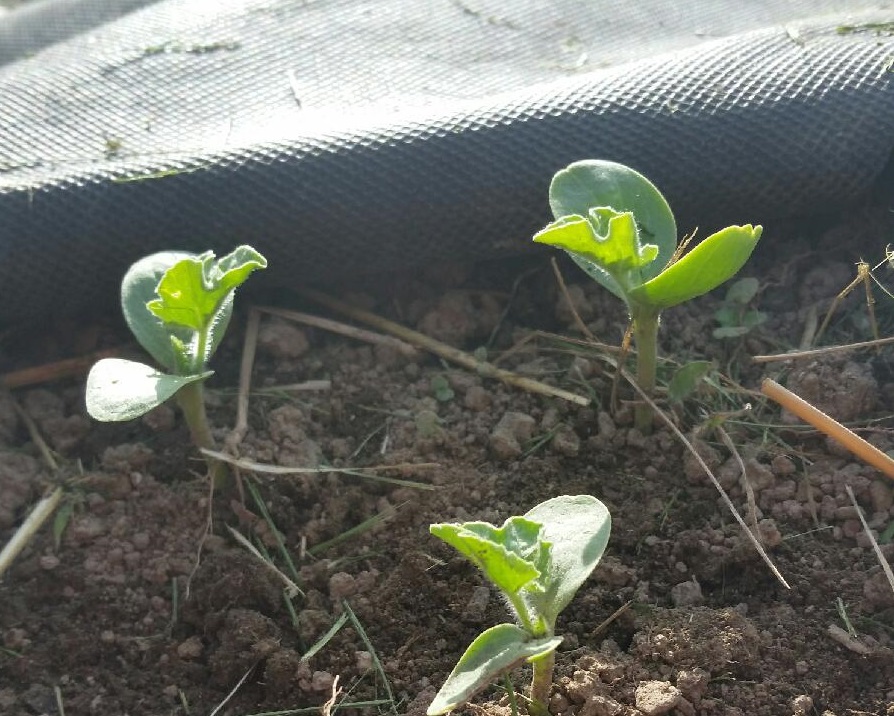GARDEN WORKS: Exciting times in the garden

photo by Emily Cates
 by Emily Cates
by Emily Cates
This time of year is buzzing with possibilities! The last spring frost of the year most likely has passed us by, clearing the way for warm-weather plantings. And although it’s a bit on the late side for trees, shrubs, and peas, we can be sure to plant greens, cole crops, cover crops, carrots, radishes, potatoes, onions, perennials, flowers, and herbs with abandon. To be on the safe side, it’s always a good idea to wait until after May 31, for tomatoes, corn, squash, peppers, eggplant, pumpkins, and the like. Unless we have another freak late frost, I would say, “Plant away after Memorial Day!”
If the weather continues to be so dry, however, make sure anything planted receives adequate moisture. Drip irrigation systems are preferable to a soaker hose, since a large proportion of moisture sprayed from a hose or sprinkler is lost through evaporation. Watering at night will conserve moisture by preventing water from evaporating in the sun. I noticed this spring that the trees and shrubs I planted needed an extra five gallons or so of water per tree every other day in May. Usually there is adequate of rain this time of year- but this year, like most years as of late, is a typical Maine spring; the one thing you can count on is the weather being unpredictable! Being prepared for this challenge is one way we can stay ahead of the game.
Naturally, there is little most of us can do to prevent a late heavy frost. That pattern would fool many flowering shrubs and fruit trees into blooming only to be nipped by the frost. Though that would mean little or no fruit this year for the affected specimens, we can take to heart that hopefully that wouldn’t happen again the following year. And if it does, it may help to consider planting cultivars that are late blooming, frost tolerant, or extra hardy. Most of our area is zone 4 (-20 to -30 degrees F.) with occasional zone 5’s (-10 to -20 degrees F.). Choosing a perennial plant, shrub, or tree that is rated to grow in the next zone down- zone 3 (-30 to -40 degrees F.), for instance – will ensure a plant’s hardiness. Remember, too, that a heavy snow pack should act as a blanket and keep a plant warmer than if there is low accumulation; so might a heavy mulch.
One thing that certainly doesn’t mind the weather was the weeds. These guys are public enemy Number One in many gardens. Any efforts to minimize them early in the season before they go to seed will help keep them at bay throughout this growing season and others. Cultivating, hand-pulling, mulching, and growing in raised beds and containers are all earth-friendly ways to make the job easier without resorting to chemical herbicides. Undiluted plain distilled vinegar works wonders on the ones in the cracks in the walkway and driveway. Plus, it’s cheap, eco-friendly, and safe to use around children and pets. Give it a try. And if you’re really adventurous, maybe you’ll consider the possibility of raising weeder geese in the garden. Many folks pen them in the strawberry patch until the fruit forms. They eat the weeds, but not the strawberry plants – though it should be noted that they love the fruits as much as we do. (Hence timing is important with this particular venture.)
While you’re planting seeds in the garden, remember to grow some plants that attract beneficial insects. Most of these have umbrella-like flowers such as those found on dill, fennel, carrot, caraway, valerian, angelica, and Queen Anne’s lace. And don’t forget to plant some edible flowers like nasturtiums and delicious herbs like basil. And for a change of pace, try growing heirloom and open-pollinated seed varieties and save the seeds for next year. Or try making a completely new variety altogether by cross-pollinating two different varieties of the same plant that will cross, such as cucumbers. Ah, the possibilities of the late-spring garden!
Emily Cates can be contacted by email at EmilyCates@townline.org.
Responsible journalism is hard work!
It is also expensive!
If you enjoy reading The Town Line and the good news we bring you each week, would you consider a donation to help us continue the work we’re doing?
The Town Line is a 501(c)(3) nonprofit private foundation, and all donations are tax deductible under the Internal Revenue Service code.
To help, please visit our online donation page or mail a check payable to The Town Line, PO Box 89, South China, ME 04358. Your contribution is appreciated!


Leave a Reply
Want to join the discussion?Feel free to contribute!